|
|
|
Sort Order |
|
|
|
Items / Page
|
|
|
|
|
|
|
| Srl | Item |
| 1 |
ID:
124427
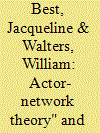

|
|
|
|
|
| Publication |
2013.
|
| Summary/Abstract |
Like any multiplicity, "actor-network theory" is many things: an influential current within the sociology of science and technology; a relational and anti-essentialist form of materialism; an insistence that notions of agency not be confined to human subjects but embrace objects, devices, and other non-human entities; and much else besides.
|
|
|
|
|
|
|
|
|
|
|
|
|
|
|
|
| 2 |
ID:
124429
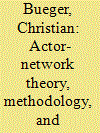

|
|
|
|
|
| Publication |
2013.
|
| Summary/Abstract |
Since its initial formulation in science and technology studies, actor-network theory (ANT) has spread like wildfire throughout the social sciences. Wildfires are fueled by dry and flammable vegetation as well as hot, gusting winds. ANT finds flammable vegetation among those frustrated with many of the conventions, dualisms, and dilemmas of the traditional social sciences. ANT promises to liberate scholars from strict dualisms such as the nature/society divide and the agency/structure dilemma. It claims to open up a reflexive discourse on what constitutes the practice of science. ANT's avant-garde spirit further fuels the fire. Others reject ANT. They (rightfully) lament the often-awkward terminology of ANT, its lack of appropriately defined models and concepts, its literary style of presentation, as well as the radical rhetoric that often comes along with it. For many, the question of what actually constitutes ANT remains mysterious, and it is often unclear whether it is more than a "new materialist" argument for taking objects, things, and technology seriously.
|
|
|
|
|
|
|
|
|
|
|
|
|
|
|
|
| 3 |
ID:
124424


|
|
|
|
|
| Publication |
2013.
|
| Summary/Abstract |
Indigenous peoples are often perceived as custodians of nature owing to their close relationship with their environment and their nature-based livelihoods. This paper investigates the kinds of environmental agencies that are constructed for, and by, indigenous peoples within the United Nations (UN) Permanent Forum on Indigenous Issues (PF) and the Arctic Council. The particular focus of this research is the issue of responsibility. The article brings together empirical materials from the two forums and engages with them using Foucault-inspired approaches. We offer a critical discussion of indigenous peoples' environmental agency in international politics, addressing the need to problematize representations of indigenous agency that to date have been largely unchallenged in both the practice and study of international politics. We identify three perspectives through which the environmental agency of indigenous peoples is validated and justified: having particular knowledge, being stakeholders, and having a close relationship with nature. Certain kinds of expectations are inscribed in each of these perspectives; responsibility becomes intertwined with agency.
|
|
|
|
|
|
|
|
|
|
|
|
|
|
|
|
| 4 |
ID:
124422
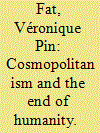

|
|
|
|
|
| Publication |
2013.
|
| Summary/Abstract |
The academic discipline of International Relations has yet to systematically begin tracing the impact of posthumanism on ethics in global politics. In a context where a humanist picture of the subject is in "a state of crisis that is more acute than ever," and the "end of humanity" is being declared by some, the question arises as to whether a moral commitment to liberal cosmopolitanism can be maintained. It arises because the moral commitments of cosmopolitanism traditionally rest on a humanist foundation, and posthumanism, at first glance, seems an obvious threat to it. In this article, rather than reading posthumanism as a threat to humanity, I read humanism as the threat. I propose that, tricky though it may be, a cosmopolitanism that embraces the end of humanity can be formulated and defended as a moral commitment to humanity: a cosmopolitanism without foundations. This cosmopolitanism without foundations is, I suggest, one way to overcome the skeptic's fantasy that we are hidden from each other, and with it the belief that our primary relation to the world is one of knowledge anchored to foundational promises of certainty. Instead, a life lived in the world with others is proposed, and with it a cosmopolitan commitment to humanity as an unavoidable ethical responsibility.
|
|
|
|
|
|
|
|
|
|
|
|
|
|
|
|
| 5 |
ID:
124423
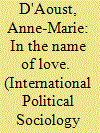

|
|
|
|
|
| Publication |
2013.
|
| Summary/Abstract |
The past 10 years have seen an increase in legislation pertaining to marriage migration in Europe. Such attention betrays various concerns and anxieties that intersect not only with issues of risk management, rights, and citizenship, but also with less tangible dimensions such as emotions, which become embedded in legal as well as in surveillance practices. Emotions such as love are integral to the institutions, procedures, analyses and reflections, calculation, and tactics that Foucault identified as part of governmental processes; the latter should not necessarily be equated with (and limited to) rationalized technocratic processes detached from emotional components. Technologies of love are central to the governmentality of marriage migration; as modes of subjectification and governing practice, they connect intimacy with citizenship. More than the manifestation of the rationalization of a specific emotion, technologies of love allow for an exploration of what an engagement with emotions such as love does to governmentality. Illustrations of the "attachment requirement" in Denmark, and the case of "Catgate" in Great Britain, show that technologies of love play a significant role in stirring and disciplining specific migration flows (what kind of marriage migrants the state welcomes or keeps at bay), but also in challenging, even if inadvertently, those policies and practices designed to gauge "true" relationships.
|
|
|
|
|
|
|
|
|
|
|
|
|
|
|
|
| 6 |
ID:
124426
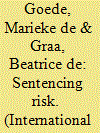

|
|
|
|
|
| Publication |
2013.
|
| Summary/Abstract |
In debates on the preemptive measures of the war on terror, criminal law is often regarded as the antithesis to exception-a conventional mode of response that acts on the basis of past harm. Since September 11, 2001, however, significant new terrorism laws have been adopted in most countries in order to make possible the disruption and prosecution of potential terrorists engaged in preparatory activities. Thus, ancillary acts undertaken increasingly in advance of actual violence are brought within the remit of criminal law. This paper engages the question of the precautionary turn in criminal law itself, and how it plays out in actual courtrooms. We examine the terrorist trial as a performative space where potential future terror is imagined, invoked, contested, and made real. By focusing on the cases of the Hofstad group in the Netherlands, and the Rhyme trials in the UK, the paper examines how present criminal offenses involving terrorist aims and intent are constituted through the appeal to potential future violence. In conclusion, the paper teases out the political dynamic of secondary risk management that-frequently-underlies contemporary terrorism prosecutions.
|
|
|
|
|
|
|
|
|
|
|
|
|
|
|
|
| 7 |
ID:
124425


|
|
|
|
|
| Publication |
2013.
|
| Summary/Abstract |
The study of the transnational transfer of practices and institutions generally looks at the intermediary and final stages of the process, with much less attention devoted to its initial steps. In contrast, this article theorizes the early part of the trajectory of transfer, conceptualized as the process through which local ideas and practices are turned into a "standard model," which we term the process of standardization. Drawing upon the public policy and social movement literatures, we identify three potentially robust mechanisms as central to the process of standardization-certification, decontextualization, and framing-and apply this framework to two cases: the transnational spread of Truth and Reconciliation Commissions and the use of conditional cash transfers as a social policy instrument. We find that the key actors in shaping the content of these standards were neither the innovators nor the early adopters but intermediary entrepreneurs located at the intersection of a complex mix of state and nonstate networks.
|
|
|
|
|
|
|
|
|
|
|
|
|
|
|
|
| 8 |
ID:
124430
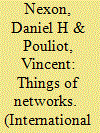

|
|
|
|
|
| Publication |
2013.
|
| Summary/Abstract |
We come to this forum not to advocate for actor-network theory (ANT) but to raise friendly questions about its role in International Relations (IR). As outsiders to ANT, we recognize that these issues may be addressed within that broader literature. But since we are proponents of the use of frameworks that share with ANT a commitment to the analytical priority of processes, relations, and practices, we also have a particular interest in its development within our field
|
|
|
|
|
|
|
|
|
|
|
|
|
|
|
|
| 9 |
ID:
124428
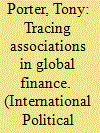

|
|
|
|
|
| Publication |
2013.
|
| Summary/Abstract |
Four decades ago, when financial globalization was attracting widespread attention, the few theoretical frameworks that were available to analyze it were relatively simplistic. Often, it was seen as an unstoppable quasi-natural expression of the expansion of market forces, operating independently of state power, which it was undermining. Today there is a rich variety of frameworks which help us understand the immensely complex entanglements of power, states, markets, and international institutions that constitute and govern global finance, including some insightful uses of actor-network theory (ANT) (for instance, Langley 2006; Best forthcoming 2013). In this contribution I highlight a number of unique contributions that ANT makes to our understanding of global finance.
|
|
|
|
|
|
|
|
|
|
|
|
|
|
|
|
| 10 |
ID:
124431
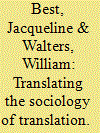

|
|
|
|
|
| Publication |
2013.
|
| Summary/Abstract |
Actor-network theory, material semiotics, the sociology of translation… The precise name of the domain in question is not itself entirely stable, and rightly so. In the ANT scheme of things, society is far less stable, representation and governance considerably more disputed, and order quite a bit more precarious, than most other frameworks would allow. Flux and impermanence are minor and tangled threads running throughout the history of the Western political imaginary: from Heraclitus and Lucretius to Nietzsche and Deleuze. No other research framework has married this minor current with empirical inquiry in a manner that is as thorough, practical, and relentlessly materialist as ANT. Bringing the Heraclitean worldview down to earth is one of its foremost accomplishments.
|
|
|
|
|
|
|
|
|
|
|
|
|
|
|
|
|
|
|
|
|